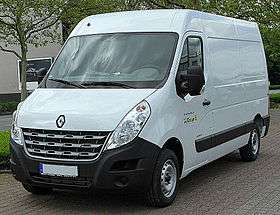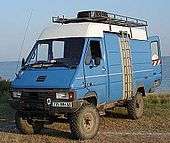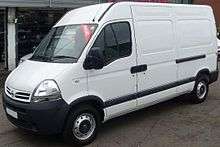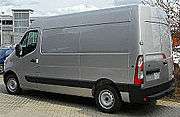Renault Master
| Renault Master | |
|---|---|
 | |
| Overview | |
| Manufacturer |
Renault Renault Trucks General Motors |
| Production | 1980-present |
| Body and chassis | |
| Class | Light commercial vehicle - van |
The Renault Midget Master is an upper-medium size van produced by the French manufacturer Renault since 1980, now in its third generation. It replaced the earlier Saviem SG3 light trucks.[1] Opel has sold versions of the second and third series vans as the Opel Movano in mainland Europe and Vauxhall Movano in the United Kingdom. All three generations have been designed and manufactured by Renault, irrespective of the brand.
Over its lifetime several different body styles have been available, from the standard van to bigger models with an increased load area, height, and longer-wheelbases with an LWB prefix. Panel vans are very common, but pickups are also available.
Heavier-duty models of the Master was also sold by (now Volvo owned) Renault Trucks as the B-series, later as the Messenger and the Mascott.
First generation (1980–1997)
| First generation | |
|---|---|
 | |
| Overview | |
| Production | 1980–1997 |
| Assembly | |
| Layout | Front-engine, front-wheel-drive |
| Powertrain | |
| Engine | |
| Transmission |
manual 5-speed |
| Chronology | |
| Predecessor | Saviem SG3 |
The original Renault Master was launched in 1980. Originally launched with the 2.5 L (2445 cc) Fiat-Sofim diesel engine, and from 1984 also with the 2.1 L (2068 cc) power unit. In rare cases the Master was sold with a 2.0 L or 2.2 L Renault petrol engine. In 1990, a marginally larger (2499 cc) version of the Sofim diesel replaced the earlier version.
They competed with a number of other manufacturer's products, but also with the smallest models of Renault's own Dodge 50 Series, which was latterly being built as the Renault 50 Series after Renault's acquisition of the United Kingdom Dodge production facilities (at the time of Peugeot's take-over of Chrysler Europe). The smaller Renault Trafic was also launched in 1980 resulting in a large range of light commercial vehicles.
The Master was distinctively styled with the sliding door design and unusual round door handles similar to those of the Fiat Ritmo/Strada. The van was manufactured at Renault's then new SoVAB Batilly plant in northeastern France.[3]
Renault B series / Messenger
.jpg)

An alternative heavier duty version which appeared almost identical, was sold by Renault Trucks as the Renault B70 to B120. It first appeared as the 70 PS (51 kW) B70 (diesel) and as the 80 PS (59 kW) B80 (petrol) in late 1982. It was a light truck with a Renault Master I body on a separate chassis, rear wheel-drive and rear dual wheels. The B-series was offered with a range of alternative body options. As the Master (and the smaller Trafic) both carried manufacturer's plates from Renault's automobile division, RVI's production numbers appeared to plummet as the SG2 and SG3 were gradually replaced. It was thus decided in 1982 to transfer the new, heavier B-series range to RVI.[1] More powerful versions were gradually added, incorporating turbochargers and intercooling.
Although a 4x4 version of the B90 took part in the Paris Dakar Rally in 1987, the "civilian" version of the B90 4x4 truck was unveiled in 1990 only, and was sold until 1999. In 1993, the B series had a grille change and was renamed Messenger.
Second generation (1997–2010)
| Second generation | |
|---|---|
 | |
| Overview | |
| Also called |
Opel Movano Vauxhall Movano Nissan Interstar |
| Production | 1997–2010 |
| Assembly |
Batilly, France (SoVAB) São José dos Pinhais, Brasil (Renault Brazil) |
| Layout | Front-engine, front-wheel-drive |
| Powertrain | |
| Engine |
diesel 2.2 I4 2.5 I4 2.5 I4 2.8 I4 |
| Transmission |
manual 5-speed 6-speed automatic 6-speed Quickshift |
The second generation Renault Master is more conventional in appearance and, though primarily developed by Renault, was available from 1998 as the almost identical Opel Movano (badged in the United Kingdom as the Vauxhall Movano), and from Renault's closely related partner Nissan, from whom it was available as the Nissan Interstar. This arrangement mirrors the collaboration between these companies on the Master's smaller counterpart, the Renault Trafic; within the industry, similar platform-sharing arrangements existed between Fiat and Peugeot/Citroen, and also between Volkswagen and Mercedes.
The Master used the Renault S-Type engine in S9U and S8W/S9W versions, the G-Type engine (G9T) and the Nissan YD engine. Displacements available (not across all chassis/body sizes) included 2.2, 2.5, and 2.8 litres with a range of power outputs.
The van received a mid-life major facelift in Q4 2003, with the headlight area being heavily restyled (together with cosmetic changes to rear lights, wing mirrors, and dashboard), resulting in the front end somewhat resembling the smaller Trafic. Like its predecessor, the van was available in a number of sizes and configurations, and was a popular base for conversion to ambulance bodywork.
-
front view of the facelifted Renault Master
-

rear view of the facelifted Renault Master
-

Opel Movano A (pre-facelift), low roof, short-wheelbase minibus
-
Opel Movano A (facelift), medium-roof, long-wheelbase minibus
-

Nissan Interstar (pre-facelift), high-roof, short-wheelbase van
-

Nissan Interstar (facelift), medium-roof, medium-wheelbase van
Renault Mascott
| Renault Mascott | |
|---|---|
|
| |
| Overview | |
| Production | 1999–2010 |
| Layout | Front-engine, rear-wheel-drive |
| Powertrain | |
| Engine |
2.8 I4 3.0 I4 |
| Transmission |
manual 5-speed 6-speed |
Renault Trucks marketed a heavy duty 3.0 L diesel version of the Master and sold it as the Mascott.[4] Other names for this rear wheel drive (RWD) version are: Master Propulsion (France), Master Pro (The Netherlands).[5]And also Master in Albania, Bosnia and Herzegovina, Croatia, Macedonia and Slovenia, Master LDT in Belgium, Master Maxi in Poland and Master Propulsion in Spain, France, Italy and Réunion. Cf. [6] Available in Europe between 1999 and 2010, it was positioned between the Master and the larger Renault Midlum.[7] It was available in two states of tune, either 120 bhp (89 kW; 122 PS) or 160 bhp (119 kW; 162 PS) with five and six speeds respectively.
Third generation (2010–present)
| Third generation | |
|---|---|
 | |
| Overview | |
| Also called |
Nissan NV400 Opel Movano Vauxhall Movano |
| Production | 2010–present |
| Assembly |
Batilly, France (SoVAB) São José dos Pinhais, Brasil (Renault Brazil) |
| Layout |
FF FR |
| Powertrain | |
| Engine |
diesel 2.3 I4 |
| Transmission |
manual 6-speed automatic 6-speed Quickshift |
A new generation of the Renault Master was introduced in May 2010, again including the rebadged Opel/Vauxhall Movano and Nissan NV400. It is the first time that either the Opel/Vauxhall or Nissan has been available with single/twin rear wheel drive.
The 2.3-litre 4-cylinder diesel engine is shared by all four marques, and is available in three states of tune, from 100 PS (74 kW; 99 bhp) to 150 PS (110 kW; 148 bhp).
Renault Trucks discontinued the Mascott and sold the third generation Master in chassis cab format only, with payloads of up to 2.5 tonnes.[8]
In the United Kingdom, the Movano is available in a large range of height, length and weight configurations and capable of transporting up to 4,500 kg (9,900 lb).[9]
-

Renault Master rear panel van
-
Renault Master Low Loader
-
Nissan NV400 long wheelbase panel van
-

Opel Movano B medium roof, long wheelbase panel van
References
| Wikimedia Commons has media related to Renault Master. |
| Wikimedia Commons has media related to Renault B series. |
- 1 2 Kennett, Pat, ed. (September 1982). "What's New: Renault revealed". TRUCK (London, UK: FF Publishing Ltd): 17.
- ↑ Walker, Alan (September 1982). Kennett, Pat, ed. "The great European retreat". TRUCK (London, UK: FF Publishing Ltd): 37.
- ↑ Renault press release 26 February 2010
- ↑ fr:Renault Mascott
- ↑ "Renault Mascott / Master Pro". buzzybeeforum.nl (in Dutch). 26 April 2014. Retrieved 6 May 2014.
- ↑ "Master Propulsion II" (in French). renaultconcepts.online.fr. Retrieved 14 May 2014.
- ↑ Roadtransport.com 12 January 2010
- ↑ Renault Trucks Master brochure
- ↑ "Auto Express Movano 2010 review". Auto Express. AutoExpres.co.uk. Retrieved 16 August 2013.
| « previous — Renault vehicles timeline 1980 to date, Western European and North American market | ||||||||||||||||||||||||||||||||||||||||||||
|---|---|---|---|---|---|---|---|---|---|---|---|---|---|---|---|---|---|---|---|---|---|---|---|---|---|---|---|---|---|---|---|---|---|---|---|---|---|---|---|---|---|---|---|---|
| Type | 1980s | 1990s | 2000s | 2010s | ||||||||||||||||||||||||||||||||||||||||
| 0 | 1 | 2 | 3 | 4 | 5 | 6 | 7 | 8 | 9 | 0 | 1 | 2 | 3 | 4 | 5 | 6 | 7 | 8 | 9 | 0 | 1 | 2 | 3 | 4 | 5 | 6 | 7 | 8 | 9 | 0 | 1 | 2 | 3 | 4 | 5 | 6 | ||||||||
| City car | 4 | Twingo I | Twingo II | Twingo III | ||||||||||||||||||||||||||||||||||||||||
| Twizy | ||||||||||||||||||||||||||||||||||||||||||||
| Supermini | 5 / 7 | Super 5 | Clio Symbol | Symbol II | ||||||||||||||||||||||||||||||||||||||||
| Clio I | Clio II | Clio III | Clio IV | |||||||||||||||||||||||||||||||||||||||||
| Zoe | ||||||||||||||||||||||||||||||||||||||||||||
| Small family car | 14 | 9 / 11 | 19 | Fluence | ||||||||||||||||||||||||||||||||||||||||
| Alliance / Encore | Mégane I | Mégane II | Mégane III | Mégane IV | ||||||||||||||||||||||||||||||||||||||||
| Large family car | 18 | 21 / Medallion | Laguna I | Laguna II | Laguna III | Talisman | ||||||||||||||||||||||||||||||||||||||
| Executive car | 20 / 30 | 25 | Safrane | Vel Satis | Latitude | |||||||||||||||||||||||||||||||||||||||
| Coupé | Fuego | Avantime | Laguna Coupé | |||||||||||||||||||||||||||||||||||||||||
| Roadster | Spider | Wind | ||||||||||||||||||||||||||||||||||||||||||
| Crossover SUV | Captur | |||||||||||||||||||||||||||||||||||||||||||
| Koleos | ||||||||||||||||||||||||||||||||||||||||||||
| Kadjar | ||||||||||||||||||||||||||||||||||||||||||||
| Mini MPV | Modus | |||||||||||||||||||||||||||||||||||||||||||
| Compact MPV | Scénic I | Scénic II | Scénic III | |||||||||||||||||||||||||||||||||||||||||
| Large MPV | Espace I | Espace II | Espace III | Espace IV | Espace V | |||||||||||||||||||||||||||||||||||||||
| LAV | Express | Kangoo I | Kangoo II | |||||||||||||||||||||||||||||||||||||||||
| Pickup truck | Alaskan | |||||||||||||||||||||||||||||||||||||||||||
| Van | Trafic I | Trafic II | Trafic III | |||||||||||||||||||||||||||||||||||||||||
| Master I | Master II | Master III | ||||||||||||||||||||||||||||||||||||||||||
| ||||||||||||||||||||||||||||||||||||||||||||||||||||||||||||||||||||||||||||
| |||||||||||||||||||||||||||||||||||||||||||||||||||||||||||||||||||||||||||||||||||||||||||||||||||||||||||||||||||||||||||||||||||||||||||||||||||||||||||||||||||||||||||||||||||||||||||||||||||||||||||||||||||||||||||||||||||||||||||||||||||||||||||||||||||||||||||||||||||||||||||||||||||||||||||||||||||||||||||||||||||||||||||||||||||||||||||||||||||||||||||||||||||||||||||||||||||||||||||||||||||||||||||||||||||||||||||||||||||||||||||||||||||||||||||||||||||||||||||||||||||||||||||||||||||||||||||||||||||||||||||||||||||||||||||||||||||||||||||||||||||||||||||||||||||||||||||||||||||||||||||||||||||||||||||||||||||||||||||||||||||||||||||||||||||||||||||||||||||||||||||||||||||||||||||||||||||||||||||||||||||||||||||||||||||||||||||||||||||||||||||||||||||||||||||||||||||||||||||||||||||||||||||||||||||||||||||||||||||||||||||||||||||||||||||||||||||||||||||||||||||||||||||||||||||||||||||||||||||||||||||||||||||||||||||||||||||||||||||||||||||||||||||||||||||||||||||||||||||||||
.jpg)


